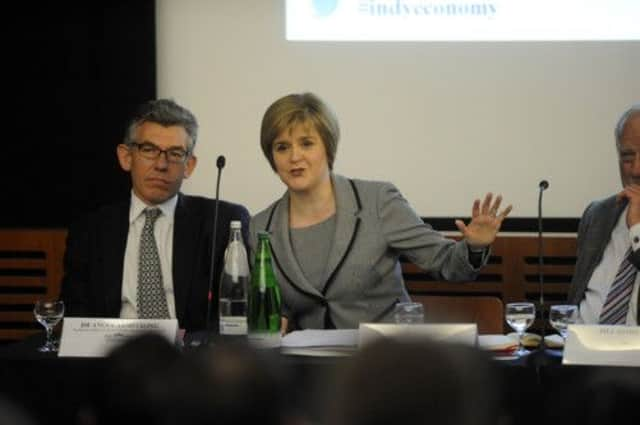Leaders: SNP cannot shirk debate over currency


These conferences have thrown up many insights into the choice this country faces, and yesterday’s event on the economics of independence was no exception.
Amid the learned academic and political observations – details of which will be published in a pull-out in this newspaper tomorrow – one contribution struck a particularly discordant note. Nicola Sturgeon, the Deputy First Minister, declined to say what the SNP fall-back position was on the currency an independent Scotland would use.
Advertisement
Hide AdAdvertisement
Hide AdThe SNP’s favoured position is a sterling currency zone in partnership with the remnants of the United Kingdom (rUK), with the Scottish Government having a role in the workings of the central bank – the Bank of England.
This is an entirely legitimate position for the SNP to take, and in the view of many experts it is the one that – if Scots vote Yes – would make the most sense from Scotland’s point of view.
The problem is that this scenario is not in the gift of the SNP, or indeed a Scottish Government of any political persuasion. It would depend on rUK agreeing to this in principle, and to the success of the negotiations that would then proceed.
Agreement may be perfectly possible, but it would not be perfectly straightforward. Before agreeing in principle, rUK would want to satisfy itself that the Scottish Government would not be a destabilising influence within the sterling zone. Safeguards and assurances would be sought, involving Bank of England oversight of the macro-economic policy of an independent Scotland.
If the principle was politically impossible to concede in an rUK wary of a eurozone set-up, or if the negotiations were extracting too heavy a price from Holyrood, it is not at all inconceivable that the SNP’s first preference might prove elusive. In which case, what is the fall-back position?
Asking a politician for their Plan B is one of toughest questions in politics. Alex Salmond’s usual reply in such circumstances is that he only answers hypothetical questions predicated on success, not on failure. This seemed to be Ms Sturgeon’s attitude yesterday.
But is this really good enough? Is using the pound outwith an official sterling zone really so much of a problem that it cannot be proposed as a fall-back? Are the Nationalists simply desperate to avoid a discussion about a separate Scottish currency, or adoption of the euro?
This matters. The currency people get paid in and have their savings in is probably of greater importance to voters than issues such as membership of Nato and the European Union, important though these are. The SNP needs to be more upfront about the options.
Have your say in naming new bridge
Advertisement
Hide AdAdvertisement
Hide AdTHERE has been much harmless fun to be had over the competition to name the bridge currently known by the rather prosaic title of the Forth Replacement Crossing.
Inevitably, the competition has thrown up a range of possibilities, including the daft, the humorous and the inappropriate – the Rab C Nesbitt Bridge, anyone? Perhaps not.
In April, the Scottish Government announced a sensible – if not terribly inspiring – shortlist, and yesterday transport minister Keith Brown revealed the three leading options in the selection process, in which the winner is to be decided by a public vote.
These were – in strict alphabetical order – the Caledonia Bridge, the Queensferry Crossing and the St Margaret’s Crossing.
It is not every day that one gets a chance to stick a label on part of the Scottish landscape, which is what this bridge will inevitably become upon its completion.
Whichever name is chosen, it will become part of the everyday speech of the country for many decades to come, and part of the fabric of millions of lives.
So, it might be wise to choose carefully. And if there is one option that appeals more than the others, it might be a good idea to vote for it. Likewise if one dislikes a particular contender enough to want to back a rival option.
It is good that these decisions are being left to the public to decide – once a few safeguards are in place to avoid it being named after a Star Wars character or passing popular culture fad, of course.
So, make your view known. The website for the competition is namethebridge.co.uk, and voting ends on Friday. We will cross that bridge when we come to it, but first we have to name it.